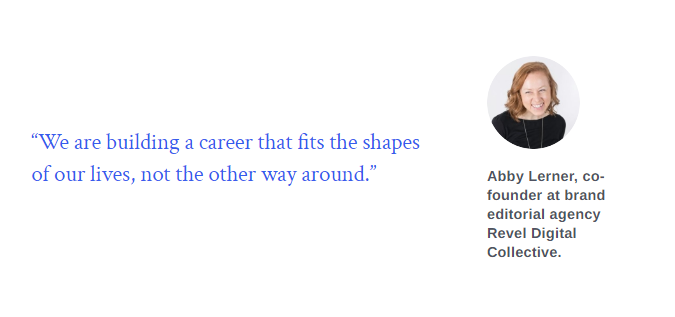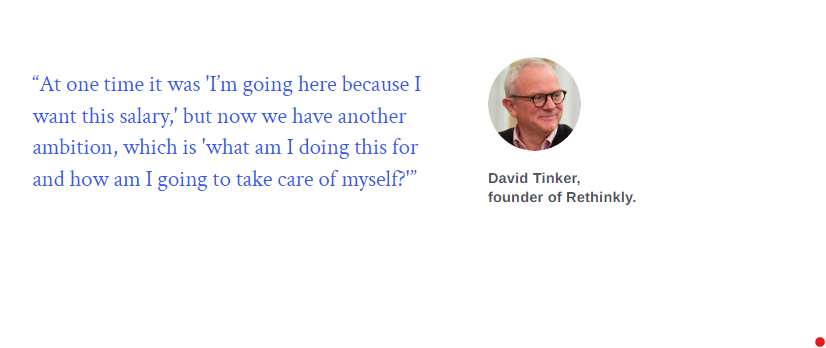
An individual’s personal sense of achievement looks a little different post-pandemic.
It’s no less ambitious, but rather than being laser-focused on a person’s job, it’s spread across a range of factors that contribute to their sense of fulfillment.
This new definition of success is no longer tied to climbing the corporate ladder, and has been dubbed “quiet ambition.” But while it is tied to the ongoing quiet workplace phenomenon in name, unlike its quiet siblings (quitting, firing, constraint) it doesn’t signal a pushback or general feeling of employee disengagement. But, like the other quiet trends, it does indicate a shift in mindset towards the purpose of work. And for that reason, it’s important employers learn how to support it.
We spoke to two experts to learn more about what exactly quiet ambition is and why it matters in the workplace.
What is quiet ambition?
The term, dubbed by Fortune, describes when someone no longer works hard solely for the sake of a company’s bottom line, but for a long-held dream or personal fulfillment needs.
“We are building a career that fits the shapes of our lives, not the other way around,” said Abby Lerner, co-founder at brand editorial agency Revel. “It doesn’t mean dropping everything and traveling the world for this fancy-free life. It might just mean being okay with a different path to growth.”
There isn’t one way to be ambitious, she stressed. “Success to one person might mean being able to shut down their computer for the weekend and not think about it. To another person, it might be making a certain amount of money or working at a certain company. It’s figuring out what your values are and what’s important to you and not some big external force putting it on you.”
Like many workplace trends, quiet ambition has been driven by the events, and repercussions, of the Covid pandemic. People from across the globe were brought face to face with severe illness, death, and other significant life changes. However, it can also be driven by uniquely personal experiences, big or small.
Lerner used to run a wellness startup where she found herself working 12 hours a day and not getting any sleep. She had no real boundaries. She said it was “because of the desire to be the best at my job and get the next impressive achievement.”
“It led me to rethink what I wanted in my career and what was my ultimate goal,” said Lerner.
She said a misconception is that quiet ambition is something you can decide overnight. She had a trial-and-error process, but ultimately confirmed that she needed autonomy and ownership of her time. “That was more important than any fancy job title,” said Lerner.
Does it mean that the person won’t be working as hard or as ambitious?
That’s not the case at all. In fact, someone who reassesses their drive to be ambitious and channels it into something more meaningful to them might end up being more successful than before.
“It’s easy to mistake quiet ambition for a lack of ambition,” said Lerner. “That’s just not true at all. The desire to achieve success is still very much there, it’s just that my definition of success has changed over the years. What I value most has changed.”
People are prioritizing their own needs over working overtime.
“It’s a different way to be ambitious or to achieve a new path to career growth,” said Lerner.
Lerner’s other co-founders are also partaking in quiet ambition. For Cristina Goyanes, it was particularly important during her father’s diagnosis of cancer in 2022 when she had to take on the role of caretaker.
How is psychological safety a part of this?
All three of Revel’s co-founders act with quiet ambition and that makes them good role models for their employees who may want to do the same.
However, ensuring the balance is appropriate is crucial. If a worker decides to adjust their meaning to work in a way that prioritizes their own needs more, it might worry a manager or boss who is still thinking about the company’s bottom line. However, when there is a culture of psychological safety, employees and employers can work together to create a dynamic that works for everyone.
“It’s finding ways to create psychological safety for people to express how they feel and to know that there is enough openness in the culture of the organization to express an opinion to feel heard and to feel a part of something,” said David Tinker, founder of Rethinkly, a workplace solution for building communication and culture. “Increased levels of transparency really help with this.”
Tinker argues that it is crucial that workplaces adapt to these adjustments in the definition of ambition, no a more personalized basis, and ensure their employees can feel the active changes being made to support them.
Tinker referenced a recent conversation with an HR director, who said employees are a lot more self-reflective in their conversations with him. “They’re asking the questions: ‘What is the point of my life? What is driving my career? How will my role have an impact on others in the community and the planet?’” said Tinker.
He says that it’s been a problem for employers when their employees ask those bigger questions and they don’t have all the answers.
“At one time it was ‘I’m going here because I want this salary,’ but now we have another ambition, which is ‘what am I doing this for and how am I going to take care of myself?’,” said Tinker. “That’s meaning-making for some people.”
…
This article first appeared in https://www.worklife.news
Seeking to build and grow your brand using the force of consumer insight, strategic foresight, creative disruption and technology prowess? Talk to us at +971 50 6254340 or engage@groupisd.com or visit www.groupisd.com/story


